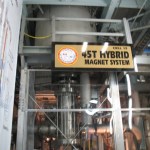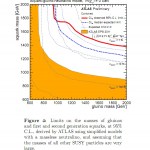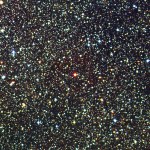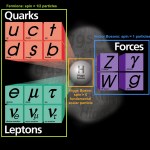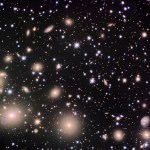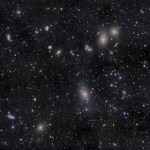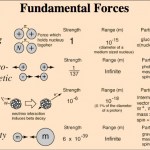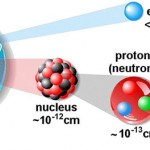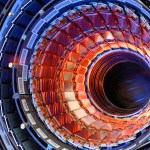cern
The sun came out and I was called out of a session, so I took advantage of the sunshine, after three days of grey and drizzle, to see the outdoor booths set up all around the buildings in the Carlsberg complex, here. In fact, in conjunction with this main festival of science, the city of Copenhagen is hosting a "Science in the City" fair here and all over the city. Here's what I saw:
The point of this 3-D printed head is to create better devices -- eg. hearing aids. Several 3-D printers on display.
Here's my favorite:
They are working on a "family" solar car. Not sure how a family will…
"It is no good to try to stop knowledge from going forward. Ignorance is never better than knowledge." -Enrico Fermi
As you probably know, the Large Hadron Collider -- site of discovery of the last fundamental particle in the Standard Model, the Higgs Boson -- is the most energetic particle accelerator in the history of humankind. When the upgrades it's currently undergoing are complete, it will reach collision energies of 14 TeV.
Image credit: CERN / LHC, add-on created by http://www.panglosstech.com/.
The way this happens is that protons are circulated in a giant ring, underground,…
Magnets are neverendingly awesome, and superconductors may be the ultimate in cool—they are, after all, literally extremely cold. And not just anyone has the tools to weave superconducting magnets with compressed metallic thread. It's a more essential skill than you might think.
Ultra-cold superconducting magnets steer high-speed particles inside colliders, keeping the beams tight and guiding them smoothly through the curves of circular racetracks. But those magnets generally rely on iron, an intrinsically magnetic metal, for key structures. That works beautifully for the …
“Supposedly she’d died, but here she was again–somewhat changed, but you couldn’t kill her. Not when the truest part of her hadn’t even been born.” -Denis Johnson
Over the past 100 years, our picture of the Universe has changed dramatically, on both the largest scales and the smallest.
Image credit: Richard Payne.
On the large-scales, we've gone from a Newtonian Universe of unknown age populated only by the stars in our own Milky Way to a Universe governed by General Relativity, containing hundreds of billions of galaxies.
Image credit: Rhys Taylor, Cardiff University.
The age of this…
"All our sweetest hours fly the fastest." -Virgil
If you've been around the block once or twice, you know that the speed of light in a vacuum -- 299,792,458 meters-per-second -- is the absolute maximum speed that any form of energy in the Universe can travel at. In shorthand, this speed is known as c to physicists.
Image credit: user Fx-1988 of deviantART.
But you or I, no matter how hard we try, will never attain that speed. There's a simple reason for this: we have mass. And for an object with mass, you can accelerate it all you want, but it would take an infinite amount…
"If you're a reporter, the easiest thing in the world is to get a story. The hardest thing is to verify. The old sins were about getting something wrong, that was a cardinal sin. The new sin is to be boring." -David Halberstam
It was only a few months ago that both collaborations at the Large Hadron Collider in CERN -- CMS and ATLAS -- announced the discovery of a new particle at about 125-126 GeV of energy: something that looked an awful lot like what the Standard Model predicted the Higgs Boson should be.
Image credit: the CMS detector at CERN, 2009.
This was the result of decades of…
At the beginning of the year, we published an interview with Dr. Zohar Komargodski on this blog. Apparently we were not the only ones impressed by Komargodski’s accomplishments: The Fundamental Physics Prize Foundation has announced that he will be one of three recipients of a New Horizons in Physics Prize. This prize is given to promising young theoretical physicists, and it includes $100,000 in prize money.
We also wrote about last year’s Fundamental Physics Prizes, handed out by billionaire Yuri Milner. The new Prizes will be officially announced in March, 2013, at CERN.
Our…
"...this consensus has been brought about, not by shifts in philosophical preference or by the influence of astrophysical mandarins, but by the pressure of empirical data." -Steven Weinberg
One of the most fundamental questions we could ever ask about all of existence is "What makes up the Universe?"
Image credit: Misti Mountain Observatory.
I don't mean "stars and galaxies," like you see above. That might make up the Universe on the largest scales, but that's taking a look at the question of what the fundamental constituents of the Universe compose themselves into.
The other side of the…
"The particle and the planet are subject to the same laws and what is learned of one will be known of the other." -James Smithson
The entirety of the known Universe -- from the smallest constituents of the atoms to the largest superclusters of galaxies -- have more in common than you might think.
Image credit: Rogelio Bernal Andreo of http://blog.deepskycolors.com/about.html.
Although the scales differ by some 50 orders of magnitude, the laws that govern the grandest scales of the cosmos are the very same laws that govern the tiniest particles and their interactions with one another on the…
"Even if there is only one possible unified theory, it is just a set of rules and equations. What is it that breathes fire into the equations and makes a universe for them to describe?" -Stephen Hawking
After a long search spanning more than my entire lifetime (so far), the Higgs boson has finally been discovered at both detectors -- CMS and ATLAS -- at the Large Hadron Collider at CERN.
Image credit: CERN / Particle Physics for Scottish Schools.
For a little more on this, check out the earlier posts here celebrating Higgs week:
The Biggest Firework of them all: The Higgs
How the…
"We knew that we had indeed done something that was very different and very exciting, but we still didn't expect it to have something to do with physical reality." -Gerald Guralnik, co-developer of the Higgs mechanism
Might as well make this entire week "Higgs week" here on Starts With A Bang, given how important yesterday's discovery/announcement was! It isn't every day, after all, that you see a theoretical physicist on the 7PM news. (Video here.)
Image credit: KGW.com.
(So proud of Portland, OR's local TV station, KGW NewsChannel 8, for being willing to promote science to the whole city…
"Give me a coin. <Takes Coin.> All right. Uh... heads, I win, tails, you lose. Right? <Flips coin.> Tails, you lose." -Ralph Kramden
All things being equal, you're well aware that if you flipped a completely fair coin, you'd have a 50% chance of it landing on heads, and a 50% chance of landing on tails (ignoring the side, of course).
Image credit: C. Nolan, A. Eckhart and Warner Bros. Pictures, retrieved from http://explow.com/Two-Face.
So let's imagine that you flip the coin ten times, and you get seven heads and three tails. Are you worried? You shouldn't be; in…
The positive and sometimes unexpected impact of particle physics is well documented, from physicists inventing the World Wide Web to engineering the technology underlying life-saving magnetic resonance imaging (MRI) devices. But sometimes the raw power of huge experiments and scientific ambition draw the recognition of those seeking only the most extreme and impractical achievements on Earth.
Brookhaven National Laboratory’s Relativistic Heavy Ion Collider (RHIC) smashes particles together to recreate the incredible conditions that only existed at the dawn of time. The 2.4-mile…
The world is buzzing from the latest news about the Higgs boson. Last Tuesday, scientists at CERN announced that they have made significant progress towards the search of the Higgs boson. Scientists are confident that the progress made will bring them much closer to the discovery by the end of next year.
At the Festival Expo, you will have the incredible opportunity to find out first hand from the experts about the details regarding this "God Particle". The Festival is honored to have The Atlas Experiment at the Large Hadron Collider (New York University), a research group that works at…
The Weizmann Institute's Prof. Eilam Gross is currently the ATLAS Higgs physics group convener. He originally wrote this piece in Hebrew for the Yediot Aharonot daily.
The Best There Is - For Now
"The God Particle," as the Higgs boson is often called, comes from the title of the book by Nobel laureate Leon Lederman that deals with the search for the elusive particle. This particle, according to the Standard Model of Particle Physics, is responsible for giving mass to all of the elementary particles in nature.
The mass of an electron determines the size of a hydrogen atom; ultimately the size…
The good news: Despite their best efforts, the folks at CERN failed to produce a black hole that sucked the entire earth into it! That would have been cool. The bad news is for string theory. What might be one of the few empirical tests for that tangle of math and stuff seems to have come out negative. From CERN:
The CMS experiment at CERN's Large Hadron Collider (LHC) has completed a search for microscopic black holes produced in high-energy proton-proton collisions. No evidence for their production was found and their production has been excluded up to a black hole mass of 3.5-4.5…
Based on some of the (many) comments spurred by the appearance of PepsiCo on ScienceBlogs, we want to clarify Brookhaven's involvement on this site.
In April, Brookhaven was invited by ScienceBlogs editors to join the community as an institutional blogger, along with the Weizmann Institute of Science and the SETI Institute (and later, CERN and the Howard Hughes Medical Institute).
There's no money being exchanged between Brookhaven and ScienceBlogs.
Of course, we see this as a good public relations opportunity. But that doesn't mean that this space will only be used to redistribute press…
If you're American, chances are you'll be looking up this weekend for a spectacle of physics. But you also can look down from above -- way, way above -- to see the homes of some of the greatest physics experiments on Earth.
Brookhaven's Relativistic Heavy Ion Collider (RHIC) is probably one of the most visible particle accelerators from space.
Check out this satellite shot from 1982, when construction was underway for RHIC's predecessor, ISABELLE:
And this more recent aerial shot, taken in May:
RHIC is the first machine in the world capable of colliding heavy ions, which are atoms that…
OK, so Friday Fun a day late.
Anyways, April Fools day was a couple of days ago and I thought that the ScienceBlogs home page was the funniest science-related prank of the day.
So, for those of you that missed the headline and the little story that went with it, here goes:
CERN Scientists Awaken Balrog
When the Large Hadron Collider brought protons up to full speed on Tuesday,
smashing them together at 99 percent the speed of light, the world did not end
as some feared. But disturbing news emerged Thursday morning that CERN
scientists have desperately been trying to cover up a catastrophe of…
tags: CERN's Large Hadron Supercollider, physics, music, streaming video
It is predicted that the world will end at 3am ET when CERN's Large Hadron Supercollider was turned on, creating a giant black hole that will suck the earth into it, destroying everything. Since we still exist, I guess it's time to sing a little, right? [4:49]
Credits:
There has been a lot of interest in the original mp3, lyrics, and vocals for remixing. You can find all that here.
Images came from:
particlephysics.ac.uk, space.com, the Institute of Physics, NASA, Symmetry, and Marvel
The talented dancers doubled as…

